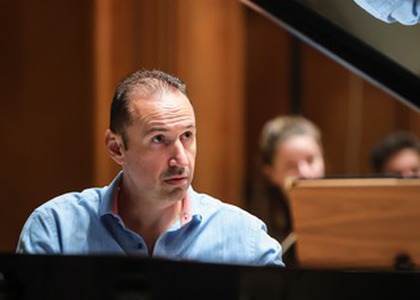> [Archived] Interviews

Interview with pianist Simon Trpèeski
The first concert in a series dedicated to the complete symphonic and concerto works by Johannes Brahms takes place on the stage of the Radio Hall on Friday, November 10th. Under the baton of Nicolae Moldoveanu, the National Radio Orchestra will perform this evening, Concert no. 2 op. 83 for piano and orchestra - with soloist Simon Trpèeski - and the Second Symphony op. 73 in D major.
How have rehearsals been so far?
I had a very useful first rehearsal today, considering how big the Piano Concerto is. I went through the whole work, worked in detail certain moments of a few movements, I would say it was a good start to the process of forming the whole work. It is the first time I have worked with the National Radio Orchestra and it is also the first time I have worked with the Moldoveanu maestro, so it is a pleasure to have this opportunity and I am very pleased that I could accept the invitation. It's the last big orchestra from Bucharest that we hadn't collaborated with yet.
How does this Brahms Concerto fit into your repertoire? What feelings bind you to him?
After such a rehearsal, I feel tired! I started to learn the first concert and then, later, I had the idea to take part in the 100th anniversary tour of the Oslo Philharmonic with Vassily Petrenko, so I also learned the second one, because I played both concerts during the tour. Of course, I was very honored to have this opportunity to learn the piece of work; I have, of course, become familiar with chamber music and piano works, but I had never approached piano concertos until five or six years ago. I became more aware of the importance of these works, the mastery of a genius like Brahms, so that, from that point of view, I considered that learning the Piano Concerto no. 2 - the longest piano concerto that I have ever played, like most pianists who have it in their repertoire - I would feel happier and more fulfilled, being enriched by the knowledge of such a masterpiece that combines the compositional capabilities of Brahms, for this piece certainly shows even more than the first Piano Concerto, the symbiosis in musical form, combining, at a fundamental level, a symphony with the considerable role of the piano. In that sense, I think I'm enriched and happy to have been privileged to be able to play such fantastic-sounding music that envelops everyone involved in the performance and process.
The CD you recorded with the WDR Symphony Orchestra from Cologne and the conductor Cristian Măcelaru will also be released on Friday. How do you remember the recording sessions?
Yes, it's a great coincidence and I'm actually very happy to have this chance, to play one of those concerts in the home country of Cristian Măcelaru, a good friend of mine and one of the world's greatest conductors. It all started spontaneously when we talked about the concerts and Cristian, the chief conductor of the WDR Orchestra, suggested it to the people there. It was certainly a happy moment for me, but also a moment full of responsibility, for it is about two of the monumental piano concertos, and it is also about a German composer with a German orchestra - so a great responsibility. The recording process is always a big journey, I find, because of course you find many facets of the work, you find many facets of yourself as a musician... In such works - the Brahms piano concertos, which are, at a fundamental level , like symphonies - you have to be in control of the situation because it takes time first of all to play it and then to work on certain details if you want to improve certain aspects. Physical time is something we should all be very aware of. Singing with Cristian Măcelaru - with whom I collaborated many times when he was debuting - is a very natural process, we became friends in a natural way; I suppose that the Romanian mentality and the Macedonian mentality had something to do with this fact, in addition to the perspectives on music that we share. I am very happy and honored that I had the opportunity to be part of this recording process, that I had this honorable opportunity to collaborate with Cristian and the WDR Orchestra while he is the music director there, and I can't wait for the comments that will come in response to this album , but I am already very happy that the launch is happening on the day of my concert here, at my first collaboration with the National Radio Orchestra, in the capital of Romania, Bucharest.
Translated by Cosmin-Ionuț Petriea,
University of Bucharest, Faculty of Foreign Languages and Literatures, MTTLC, year II
Corrected by Silvia Petrescu














